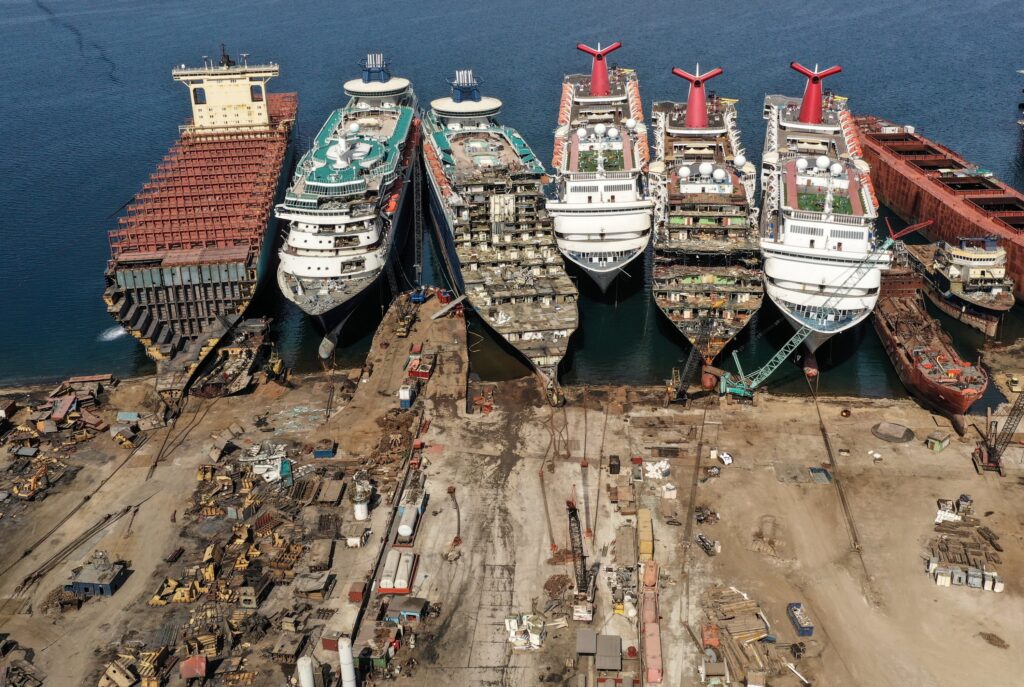Freight Sectors Defy Global Crises, Ship Recycling Markets Struggle Amidst Economic Instability
Amidst a backdrop of global crises and economic uncertainty, the freight sector is demonstrating an unseasonably strong performance, even as ship recycling nations grapple with life-threatening challenges. According to reports from GMS, a leading cash buyer, the persistent demand in the freight sector contrasts starkly with the ongoing struggles in global ship recycling markets. This unexpected strength in freight is unfolding against a grim backdrop of political instability, economic volatility, and potential geopolitical conflicts.
Rising Tensions and Economic Woes
The current global landscape is fraught with tension. Reports suggest that the specter of potential attacks against Israel and the possible removal of Russian President Vladimir Putin due to Ukraine’s successful counteroffensive is adding to the uncertainty. Such developments are fueling fears of further destabilization in an already precarious global economy.
“Consequently, we continue to see world economies trudge silently up this unnecessary hill of economic instability,” GMS commented. The statement highlights the cumulative impact of recent global events, starting with the massive backlog in global trade that began during the COVID-19 pandemic. This backlog drove inflation higher, a trend that has only been exacerbated by the attacks on and sinking of merchant vessels in the Red Sea lanes. The summer of 2024, GMS warns, is shaping up to be “a horror movie,” with levels of economic instability across the board remaining alarmingly high.
The Impact on Ship Recycling Nations
The situation is particularly dire for ship recycling nations, which have been hit hard by the ongoing crises. These nations, which rely heavily on the inflow of tonnage for recycling, are facing severe disruptions. The combination of political instability, economic uncertainty, and the threat of war has created a perfect storm that is choking off the supply of life-sustaining tonnage to these countries.
In India and Pakistan, concerns are mounting over the impact of cheaper Chinese steel imports on domestic ship recycling yards. The influx of low-cost steel is undercutting inventories and creating significant economic hurdles for local recyclers. GMS has called for further anti-dumping duties to curb these imports and protect the domestic ship recycling industry.
“As such, a meager collection of poorer condition Far Eastern-built and owned vessels has been concluded below USD 500/LDT,” GMS reported, indicating that the markets are still reeling from the ongoing crises and are hesitant to commit to firm pricing. This cautious approach reflects the broader uncertainty in the market, as players wait to see how events unfold over the coming months.
Regional Markets Struggle with Instability
The impact of global instability is being felt acutely in regional ship recycling markets. In Bangladesh, a modicum of stability has returned following the sudden departure of Prime Minister Sheikh Hasina from the country and the subsequent temporary takeover by the military. However, this stability is fragile, and the situation remains fluid.
In India, there was a minor yet welcome surprise in the market fundamentals, offering a glimmer of hope amidst the prevailing gloom. However, this positive development was offset by a sharp decline in the Pakistani market, where buyers have once again dropped down the rankings. In Turkey, the situation continues to deteriorate, with the market suffering silently week after week.
The outlook for the global ship recycling industry remains bleak. GMS noted that vessel offers are tentative and nearly non-existent from certain recyclers, who are reevaluating the markets based on unfolding sentiments, domestic fundamentals, and global events. This hesitancy reflects the deep uncertainty that pervades the industry, as players grapple with a rapidly changing landscape.
The Freight Sector’s Surprising Resilience
In stark contrast to the struggles of the ship recycling industry, the freight sector is performing unseasonably well. Despite the challenges facing the global economy, demand for freight services has remained robust. This resilience is surprising, given the widespread economic instability and the potential for further disruptions.
Several factors are contributing to the strength of the freight sector. The ongoing global trade disruptions have created a backlog of goods that need to be moved, driving up demand for freight services. Additionally, the resilience of certain key economies has provided a boost to the sector, even as other parts of the world struggle with economic challenges.
However, this strength in the freight sector is not without its risks. The ongoing crises have created a highly volatile environment, and the potential for further disruptions remains high. The situation in the Middle East, where the monsoon rains and political instability have created a “forced holiday” for the global ship recycling community, is a case in point. Any further escalation in tensions or instability could have serious consequences for the freight sector, potentially disrupting the flow of goods and creating new challenges for the industry.
Looking Ahead: Uncertainty and Caution
As the summer of 2024 unfolds, the outlook for the global economy remains deeply uncertain. The freight sector’s surprising resilience offers a glimmer of hope, but the broader picture is one of caution and concern. The ongoing crises in ship recycling nations, coupled with the potential for further geopolitical disruptions, create a highly unstable environment.
For now, the global ship recycling community is in a holding pattern, waiting to see how events will unfold. The next few months will be critical, as markets take stock of the situation and assess the risks and opportunities that lie ahead. Whether the freight sector can continue its strong performance in the face of these challenges remains to be seen, but for now, the industry is navigating through uncharted waters, with the specter of further instability looming large on the horizon.
In this environment of uncertainty and caution, the global economy is at a crossroads. The decisions made in the coming months will have far-reaching consequences, not only for the freight and ship recycling sectors but for the broader global economy as well.







